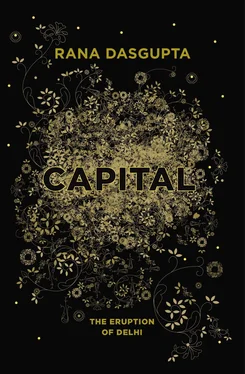The whisper goes around that the guru is awake, and, very slowly, the line of cross-legged people begins to move. After a couple of hours we reach the top of the steps outside the guru’s room, and we are ushered in.
The room is large, and there are still many people ahead of us. If I expected any great surge of feeling on seeing the guru, I am disappointed. He does seem like the only normal person in the room — everyone else is in a slightly altered state — but I don’t feel anything more exceptional than that. He is just back from a day selling bathroom fittings: he still wears his suit, and he is sitting cross-legged on a bed with his socks on.
People kneel in front of him and everyone can hear what is being said: “My daughter is doing badly at school. I am suffering from pains in my knees.” One woman gives the guru a letter to read: she is crying. To most of these supplicants, the guru gives a steel cup of drinking water that he has previously blessed by holding it against his forehead. To others he gives cardamom seeds.
A favourite phrase of Delhi businessmen is, “Your bad deeds always come back to you.” In the course of accumulating wealth you must pay bribes, steal from the system, intimidate people, make enemies — and generally forget about everything that is not accumulating wealth. If you are making a lot of money it ‘proves’ that you are a favoured child of the universe: it is on your side, you have nothing to feel bad about. But even very large fortunes can sometimes seem dwarfed by the negativity that has been accumulated in the process. Making this negative surplus disappear is therefore an eternal preoccupation of the business classes. You have to find other beings to take your negativity from you, places where it can be dumped and never return. Giving charity is good: it shifts some of your negativity from you to the person you are giving to. Going on pilgrimages earns you credit that can be offset against this negativity. But the dream of course is a mechanism that can make your negativity simply disappear.
“Those people have come with manifestations of negative return. An aching back, a child failing in school — it’s all because of negativity. The cardamom seeds take the negativity away. The guru blesses the person and the negativity is transferred to the cardamom seeds. The seeds are then thrown into the Yamuna river, where the fish eat them.”
If there are still any fish in the Yamuna river.
“Fish, because they live in water, are protected from Saturn, so there the cycle of negativity ends.”
But there are volumes of negativity that all the cardamom seeds and all the fish in the world cannot absorb, and struggling against them is a full-time occupation.
Puneet asks me, “What are you going to ask him when you see him?”
I have a pang of unease.
“What do you mean?”
“Well you’ve waited all this time to see him. What are you going to ask? Why are you here?”
Puneet is not one of this guru’s ordinary followers. The guru extends special favours to him because, he says, Puneet has spiritual qualities that most people do not have. The $100 million in Puneet’s bank account might have something to do with it too; I don’t know. The point is that I have somehow imagined all this time that Puneet and I would have a private audience with the guru. A cosy chat among equals. Now I realise I am coming on my knees to him as just one more devotee among many.
The situation triggers a deep fragility in my personality. My thoughts turn to chaos. My head begins to spin. I don’t know how to speak for myself in front of this man. In front of all these other people. Everyone will know I am faking it. I am sweating, and not with the heat.
Puneet’s turn comes first. The man on the bed puts his hand on his head. Though the two of them spend their weekends watching soccer together, there is no flicker of recognition from the guru, who asks him why he has come. Puneet tells him that his eyes have recently been stinging a lot. The guru requests from his assistants a steel cup of water, which he places against his forehead and hands to Puneet.
I feel myself collapsing inside. This is the role I choose: I am the observer, not the observed. I am in a panic, and I find myself contemptible. I realise that I know nothing. Everyone else in this room knows something very basic about life that I do not. They live ; I am just an eavesdropper. I spy on life so that I do not have to live it. A non-existent wind is rushing in my ears and, in that moment, I am convinced that I have reached the age I have without ever embarking on anything real. I realise I need to speak to this guru. Maybe this has been the whole point, all along. I need a word from him to draw me in from the comfortable void of the outside. I realise I will approach him in utter earnestness.
Puneet is led away by one of the guru’s helpers. The man puts his hand on my head. It feels good. I can sense his power. He looks into my eyes.
“What can I do for you?” he says gently.
I look humbly at him.
“Please tell me,” I say, “what it is I still have to learn.”
He stares for a second.
“What did you say?”
I am embarrassed to repeat it, but I do. He smiles. He says, “Are you making fun of me?”
“No!” And it’s true.
He looks at me inquisitively. Then his face breaks into a grin.
“You shouldn’t be here,” he says.
I cannot believe it. He says, “Go away and lead your life. Stop making fun of me.”
He is laughing now.
It is over. He looks at the next person in the line. I get up and wander away.
I am devastated.
What did I do wrong? How did he see through me?
My feet lead me through the door and into the dark night outside. I run into Puneet. He is bent over and weeping copiously. I understand now why these encounters bring out people’s weakness. I put my hand sympathetically on his shoulder.
“Are you okay?” I ask.
“Yeah,” he says. “They sprayed fucking lemon juice in my eyes, dude.”
I laugh, despite myself. He is so serious about his damn eyes. We walk back to the car. He lights two cigarettes and we stand under the trees smoking.
I ask him what went wrong between me and the guru.
“Did he see through me?” I ask. “Did he realise I was a fake?”
“It’s difficult,” he says. “You don’t get to ask a question like that the first time around. It takes a lot of work to get there.”
This street is tranquil save for the crowds milling around the guru’s house. The electric gates open next to us to let a BMW convertible glide out.
Puneet says, “And anyway it’s intimidating at one level. You have to get used to it. It’s easy to fuck up because it’s not a normal situation. You know he’s looking at you, you know he can take you on a spin if he wants to. You don’t want to be fucking with that. Even I looked away from him because I just didn’t want to get messed up with that energy today. You might have noticed that I blink less than most people. That’s because I’m spiritually clean. But today I didn’t want to get into that.
“Normally I’m one of the few guys who, when I’m spiritually completely clean, can stare him down. I’m one of the few guys that he knows of. Usually, when he looks a person in the eyes he can completely fuck them up and they have to look away. But not me. There have been times when we’ve exchanged energy eye to eye for a good five minutes and people are like, ‘What the fuck is going on here?’ And then he has to tell me, ‘Puneet. Look down.’”
And now we move to the rhythm of this restlessness
On these streets many people dead they drive with recklessness
Читать дальше











